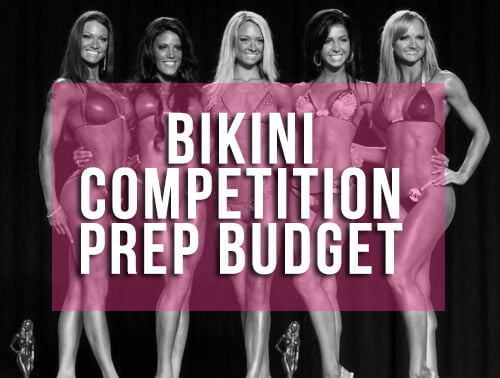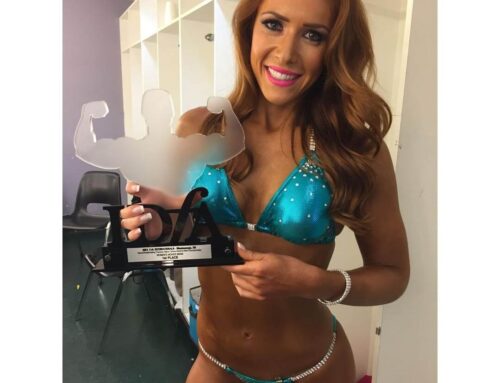
If you’ve ever marveled at the strength, beauty, and discipline of bikini competitors and thought, “Could I do that?” — this guide is for you. We’re here to demystify the prep life and show you how you too can stand on that stage, radiating confidence and knowing you’ve sculpted your best body yet.
Bikini competitions are a fascinating and inspiring display of human athleticism, beauty, and dedication. While they may seem all glitz and glamour from the outside, the heart of these competitions is a powerful testament to months, sometimes years, of competition prep, disciplined dieting, and rigorous training.
But what exactly do judges look for during these bikini competitions? Mostly, it’s about balance, symmetry, and overall physical appearance, including muscle tone and healthy skin. But they’re also looking for that spark of confidence, the way you carry yourself on stage – your stage presence. In short, it’s not just about the body, but also the mindset.
Getting Started: Setting a Realistic Timeline
Preparing for a bikini competition isn’t something you do on a whim. It’s a journey that requires an incredible amount of planning, dedication, and discipline. There are several crucial steps to consider when setting your timeline for contest prep:
Determine Your Current Fitness Level
The first step is to evaluate where you are right now. Are you a gym regular, or are you just starting your fitness journey? A certified personal trainer or fitness expert can be incredibly useful at this stage for an objective assessment. Key aspects to consider include:
- Current body composition (Body Fat Percentage)
- Strength levels
- Cardiovascular endurance
- Flexibility
Create a Preparation Timeline
Now that you have a clear picture of your current status, it’s time to map out your journey. It’s important to set a realistic timeline for your contest prep.
- If you are a beginner, aim for a longer timeline – around 20 weeks.
- If you already have a solid fitness base, a 12-16 weeks prep timeline might be suitable.
Remember, these are estimates and can be adjusted based on individual progress.
Set Achievable Fitness Goals
Setting goals is what keeps you anchored throughout your prep. It’s essential to set SMART (Specific, Measurable, Achievable, Relevant, Time-bound) goals. Some examples could be:
- Losing a certain amount of body fat within the first 8 weeks.
- Hitting a specific strength target, like a certain weight on squats or deadlifts.
- Achieving a certain level of muscle definition or size.
- Mastering the art of posing and stage presence.
With these steps in mind, remember that the journey to the bikini competition stage is YOUR journey. It’s not about rushing the process or comparing yourself to others. It’s about embracing your own pace, honoring your body, and enjoying the process as much as the end result.
Diet and Nutrition for Bikini Competitors
Crafting a competition-ready body isn’t just about the hours spent at the gym; it’s equally about the food you’re fueling your body with. Let’s delve deeper into the dietary aspects that can make or break your bikini competition prep.
Quality of Food: Choose Nutrient-Dense Options
- Lean Proteins: These are your building blocks for muscle. Opt for lean meats like chicken, turkey, and fish, and include vegetarian sources such as tofu and tempeh.
- Complex Carbohydrates: These provide the sustained energy your body needs for those grueling workout sessions. Consider foods like quinoa, brown rice, and sweet potatoes.
- Healthy Fats: Essential for hormone regulation and joint health. Avocados, nuts, seeds, and fatty fish like salmon are excellent choices.
- Fruits and Vegetables: Rich in vitamins, minerals, and fiber, they support overall health, digestion, and provide much-needed antioxidants.
Quantity of Food: Customize Your Caloric Intake
- Understand Your Metabolic Needs: Your caloric intake should align with your metabolic rate, activity level, and competition goals.
- Balance Your Macros: Your diet should have the right balance of proteins, carbs, and fats. This balance can be different for everyone, so it’s beneficial to work with a coach or nutritionist to get it right.
- Monitor and Adjust: As your body changes and competition day nears, your dietary needs will also change. Regular check-ins on your progress will help you adjust your food quantities accordingly.
Timing of Meals: Align Your Diet with Your Workout Routine
- Pre-Workout Nutrition: A combination of protein and complex carbs 1-2 hours before your workout can provide the energy you need to push through.
- Post-Workout Nutrition: A meal rich in protein and simple carbs within the 30-60 minute window after your workout can support muscle recovery and growth.
- Regular Meals: Try to have regular meals throughout the day to maintain a steady energy level and avoid extreme hunger or fullness.
Navigating the world of competition dieting can be complex, but remember, it’s a crucial part of your journey to the bikini competition stage. Listen to your body, adjust as needed, and never compromise on nourishing your body with the best.
Workout Routines for Bikini Competitors
The right workout routine is key to sculpting a stage-ready bikini competitor body. Let’s break it down into the three essential components: strength training, cardio, and flexibility exercises.
Strength Training
A cornerstone of any bikini competitor’s routine, strength training helps you build muscle mass and shape your body. Your strength training regimen should be diverse, targeting all the necessary muscle groups. Here are some exercises to consider:
- Lower Body Workouts: Squats, lunges, and deadlifts are perfect for toning your legs and glutes.
- Upper Body Workouts: Exercises like shoulder presses, bicep curls, tricep dips, and lat pulldowns can help sculpt your upper body.
- Core Workouts: Planks, bicycle crunches, and Russian twists will aid in defining your abs and strengthening your overall core.
Cardio
Cardio exercises are necessary for shedding excess fat and revealing the toned muscles underneath. Incorporate a mix of steady-state cardio and high-intensity interval training (HIIT) for maximum results. Here are a few options:
- Steady-State Cardio: This could be a 30-60 minute run, swim, or cycle at a consistent, manageable pace.
- HIIT Workouts: These workouts alternate between short, intense bursts of exercises and short rest periods. For example, one minute of sprinting followed by one minute of walking, repeated for 15-20 minutes.
Flexibility Exercises
Don’t underestimate the importance of flexibility and mobility in your training. Regular stretching can help prevent injury, improve performance, and aid recovery. Here are a few stretch exercises to incorporate:
- Hamstring Stretches: These can be done seated or standing and help maintain flexibility in the back of your legs.
- Hip Flexor Stretches: These stretches are crucial for maintaining mobility and preventing lower back pain.
- Shoulder and Chest Stretches: These help keep your upper body loose and can improve your posture.
Remember, these are general guidelines. Tailor your workout routine to fit your specific needs and goals. Consult with a fitness professional if needed, and always listen to your body. It’s your best guide.
Tips for the Final Weeks Before the Competition
The final weeks of your bikini competition prep are a whirlwind of emotions and physical exertion. It’s an exciting yet intense period where your hard work starts to pay off. Let’s break it down into key focus areas:
Refining Your Diet and Workout Routine
- Caloric adjustment: You may need to decrease your caloric intake to shed any remaining body fat. However, ensure you’re still getting enough nutrients to maintain muscle mass and energy levels.
- Workout tweaks: Your workout might shift more towards high-intensity interval training (HIIT) and cardio to fine-tune your physique and enhance muscle definition.
Prioritizing Rest and Recovery
- Sleep: Aim for a solid 7-9 hours of sleep each night. It’s during sleep that your body recovers and rebuilds muscle tissue, which is vital during this intense training period.
- Active rest days: Incorporate active rest days into your routine, like light stretching or yoga, to keep your body moving without adding stress.
Mental Preparation
- Mindfulness: Practice mindfulness techniques such as meditation and deep-breathing exercises to manage pre-competition nerves and maintain a positive mindset.
- Visualization: Visualize your success on the competition day. Imagine yourself on the stage, confident and radiant. This mental rehearsal can greatly enhance your actual performance.
Stay Connected With Your Support Network
- Check-ins with your coach: Regularly touch base with your coach or mentor to discuss any last-minute concerns or adjustments in your preparation plan.
- Family and friends: Keep your loved ones close during these final weeks. Their support and encouragement can be a great boost to your mental well-being.
Remember, the last few weeks aren’t about drastic changes but fine-tuning and preparing yourself mentally for the big day. The discipline, dedication, and resilience you’ve shown throughout your prep journey are about to pay off.
Let’s move on to the final stage: The competition day itself.
On the Day of the Competition
This is the moment you’ve been tirelessly working for. To help you navigate this pivotal day, here are some key areas to focus on:
Final Preparations Before Hitting the Stage
- Nutrition and Hydration: Maintain your energy and hydration levels. Start your day with a balanced meal and keep sipping on water. Some competitors find light, easily digestible snacks helpful in maintaining energy throughout the event.
- Posing Practice: Do a quick run-through of your posing routine. Remember, confidence is key. You know you look amazing, now it’s time to show the judges and audience.
- Outfit and Makeup Checks: Ensure your bikini fits perfectly and your stage makeup is flawless. Both should complement your toned physique, not distract from it.
Performing on Stage
- Posing: From the moment you step on stage, consider yourself in the spotlight. Make each pose count, showcasing your physique from all the right angles. Smooth transitions between poses can make your routine seem polished and professional.
- Presentation: Your smile, eye contact, and overall aura can captivate the audience and judges. Remember, it’s not just about the body – it’s about the entire package.
- Enjoy the Moment: Amidst the nerves, don’t forget to enjoy the moment. You’ve worked incredibly hard for this. Relish the spotlight; it’s your well-deserved time to shine.
Bikini Competition Prep Budget
Coaching/ Trainer
Cost: In-person=$100-150/session, online=$350+/month
This is the first and crucial thing to have. Even the pros and best coaches in the world have trainers and coaches of their own. It’s easy to know all the information and knowledge about bodybuilding and nutrition, but it’s hard to really apply it to ourselves and hold ourselves accountable. Get a coach, one who has experience working with fitness competitors (not just having completed themselves!). A competition prep coach will guide you through the processes of nutrition, training, posing, and all the essentials that come with competing (and there is a LOT more to it then just training and diet!).
Gym Membership
Cost: $10-60/month
With condo gyms becoming better these days you might be able skip the gym membership. Keep in mind you do need some essentials like squat rack, cable machine, various dumbbell and barbell weights, and other necessary equipment for weight training. Otherwise, a basic gym will do the trick for training. Just make sure they have the equipment you need for workouts from your coach.
Posing Coach
Cost: Group seminars =$30-50, private lessons =$60-120/hr
You could technically attempt to teach yourself with YouTube, which is free. The issue here lies that its not as easy as it sounds, and different federations/ categories have different requirements. Take at least a few sessions with a posing coach to really nail it!
Food
Cost: Varies
The food you eat on a competition prep adds up quickly. Even if you eat clean before you start a prep, you will start eating a lot more whole foods and protein, plus eating more frequently. The cost of your grocery list goes up. You may find yourself incorporating protein powder or perhaps foods like greek yogurt, cauliflower rice, and sweet potato into your meal plans. You also need to buy separate foods on show day and factor in post show meals/treats like rice cakes.
Supplements
Cost: Varies
You could go overboard and spend hundreds of dollars each month. It’s best to stick to the basics and ones that have evidence it works (ie. protein powder, omega-3, BCAA, vitamins).
Competition Suit
Cost: $300+
Suits can range from $300-$1000+. The fit of your suit can make or break how your physique looks on stage, so borrowing a suit may not be the best option. You can also buy an affordable plain suit, then add the bling yourself to offset costs.
Competition Heels
Cost: $50-100
A simple clear heel will do, no need to get fancy with jewels. Check your federation guidelines on height of the heel as that will vary.
Federation Membership
Cost: $75-150
Different federations will have different membership fees. All shows require you to be a member of their federation before you can compete or register for a contest.
Competition Entry Fees
Cost: $50-100
Costs are typically per class entered. On occasion, there may be discounts for early bird registration.
Competition Tan
Cost: $100-150+
This is something I HIGHLY recommend you leave to the pros. Show day there is usually an onsite tanner to give you that perfect stage glow. Let the professionals take care of that to avoid that disastrous at home tanning attempts, looking blotchy.
Hair
Cost: $50-100+
Can definitely be done on your own, however, the onsite makeup person can help with this.
Stage Make-up
Cost: $100-150+
Your makeup must be very dark to match the tan. Having a professional do it is nice for a perfect match. If you buy your own, this make up will last all of your shows. Often there are official makeup artists for the shows to help you out with this.
Jewelry
Cost: $20-80
Jewelry is to your desired taste. You can choose to wear rings, bracelets and earrings, however, you don’t need to purchase expensive bling.
Mani/Pedi
Cost: $15-60
Not mandatory, but gives a nice final touch to your look leaving your nails in good shape.
Waxing
Cost: $40+
Getting a Brazilian wax for the tiny suits leaves you careless, but not necessary. Some opt for home hair removal to save a penny.
Hotel
Cost: $100-175
Usually there is a host hotel where the athletes meeting, registration, tanning and makeup are done right at the venue. Staying there gives you ease when you get your final look together.
Transportation/ Travel
Cost: Varies
Varies depending on how far you live from the show. Competing in local shows keeps your travel affordable, but the dates may not work with your schedule.
Tickets for family/friends
Cost: $40-80
Fitness competitions are not cheap to watch, but its important to have a team of cheerleaders there who have seen you through the process.
Photography
Cost: $50-150
Many venues now have regulations on not permitting cameras in beside the official photographer. The event photographer will usually offer packages with all of the pictures they take of you during the show. Those stage shots may be worth it!
Video Critique
Cost: $50-100
If you plan on competing down the road, it is beneficial to get the video with the judge’s voice over telling you what to work on for your off season to improve.
Photoshoot
Cost: $400+
You worked really hard to get to that stage shape so you may want to capture it for remembering. Schedule a personal fitness photo shoot. Definitely not necessary.
Unplanned costs:
– Chiropractor/physiotherapist/massage to help muscles cope with the high levels of training and/or help rehab from injury or soreness
– Bikini bite/glaze for show day (often provided by tanners)
– Dumbbells/resistance bands for show day to pump up backstage
After the First Bikini Competition: Rest and Recovery
- Give Your Body a Break: Once the competition is over, gradually ease back into your normal diet and give your body plenty of rest. Remember, recovery is an essential part of fitness.
- Celebrate Your Achievement: No matter the results, you’ve achieved something extraordinary. Take time to acknowledge your hard work and celebrate this journey.
- Plan Ahead: If you loved the experience and plan to compete again, start thinking about your next steps. How can you maintain your fitness level? What improvements can you make for your next competition?
All in all, bikini competition prep is not a cheap hobby, but the rush, adrenaline and the amazing experience may be worth every penny for you. If you are comfortable with working out on your own, then you may save some money by hiring a knowledgeable bikini competition prep coach online (click on the link!) for a fraction of the cost of seeing one in person.
If you need more assistance and looking to train with a fitness competition coach in person, we would be happy to meet with you at our downtown Toronto studio.
In any case, bikini competition prep is a journey you should be ready for, so plan ahead and you will succeed! As you stand on the stage, know that you’ve pushed your boundaries and achieved something truly remarkable. Go forth and shine, competitor! You’ve earned it.



